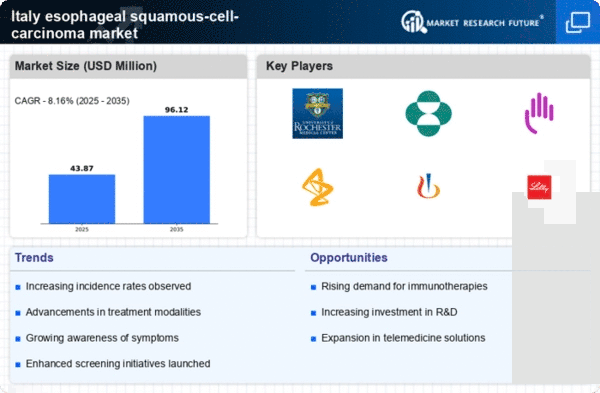Growing Aging Population
Italy's demographic shift towards an aging population significantly impacts the esophageal squamous-cell-carcinoma market. With approximately 23% of the population aged 65 and older, the prevalence of various cancers, including esophageal squamous-cell carcinoma, is expected to rise. This demographic trend suggests a higher demand for specialized healthcare services and treatments tailored to older patients. The aging population is likely to drive the need for early detection and effective management strategies, thereby expanding the market. Additionally, the increased focus on geriatric oncology may lead to the development of targeted therapies, further stimulating growth in the esophageal squamous-cell-carcinoma market.
Enhanced Diagnostic Techniques
The advancement of diagnostic techniques plays a pivotal role in shaping the esophageal squamous-cell-carcinoma market. Innovations such as endoscopic ultrasound and advanced imaging technologies have improved the accuracy of early detection. In Italy, the adoption of these technologies is on the rise, with a reported increase of 15% in the use of minimally invasive diagnostic procedures over the past few years. Enhanced diagnostic capabilities not only facilitate timely intervention but also contribute to better patient outcomes. As healthcare providers increasingly recognize the importance of early diagnosis, the demand for these advanced techniques is likely to bolster the esophageal squamous-cell-carcinoma market.
Increasing Healthcare Expenditure
The rising healthcare expenditure in Italy is a crucial driver for the esophageal squamous-cell-carcinoma market. As the government allocates more funds towards healthcare, there is a notable increase in the availability of advanced diagnostic and treatment options for patients. In 2025, healthcare spending in Italy is projected to reach approximately €200 billion, reflecting a growth of around 5% from previous years. This financial commitment enables hospitals and clinics to invest in cutting-edge technologies and therapies, enhancing patient outcomes. Furthermore, increased funding for cancer research and treatment facilities contributes to the overall growth of the esophageal squamous-cell-carcinoma market, as more resources become available for innovative treatment modalities and clinical trials.
Rising Research and Development Activities
The surge in research and development activities within Italy is a significant driver for the esophageal squamous-cell-carcinoma market. Numerous academic institutions and pharmaceutical companies are actively engaged in exploring novel treatment options and therapies. In 2025, R&D spending in the oncology sector is expected to exceed €1 billion, reflecting a commitment to advancing cancer care. This investment fosters innovation, leading to the development of targeted therapies and immunotherapies that may improve survival rates for patients with esophageal squamous-cell carcinoma. The collaborative efforts between public and private sectors further enhance the research landscape, potentially transforming the treatment paradigm in the esophageal squamous-cell-carcinoma market.
Increased Patient Advocacy and Support Groups
The rise of patient advocacy and support groups in Italy is influencing the esophageal squamous-cell-carcinoma market. These organizations play a vital role in raising awareness about the disease, promoting early detection, and providing resources for patients and families. The presence of such groups has been linked to a 20% increase in screening rates for esophageal cancers, as they encourage individuals to seek medical attention. Furthermore, these advocacy efforts contribute to shaping healthcare policies and funding allocations, ensuring that the needs of patients are addressed. As awareness continues to grow, the esophageal squamous-cell-carcinoma market is likely to benefit from increased engagement and support for affected individuals.

















Leave a Comment